Watching Whales in Monterey Bay, California
Monterey Bay is a wildlife hot spot known for frequent sightings of marine mammals, especially whales and dolphins. I joined some friends (including fellow Olympus shooters) for 4-days of whale watching in the Monterey Bay National Marine Reserve.
We had barely left the inner harbor of Monterey when we get the call that killer whales have been sighted offshore. Our Captain was whale biologist Dr. Nancy Black, founder and director of the California Killer Whale Project. It was our good fortune that naturalist Colleen Talty was also on board helping to identify the whales we encountered.
This was a great opportunity to put my M.Zuiko zoom lenses through the ultimate test – photographing fast moving marine mammals from a boat, a moving platform especially in choppy or rolling seas. For this photo adventure I chose my go-to 40-150mm F2.8 with MC-14 teleconverter, and the new M.Zuiko 150-400mm F4.5 TC1.25X IS PROwith built in 1.25x extender.
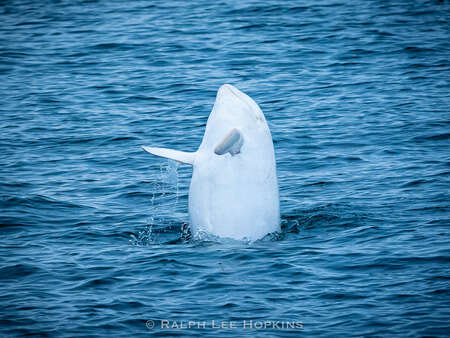
OM-D E-M1X | M.Zuiko 40-150mm F2.8 PRO
1/1000s | F5.6 | ISO 1250
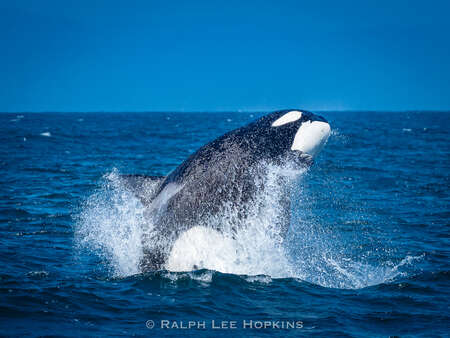
A fast shutter speed 1/1000 second or higher is essential to stop the action from a moving boat, especially in rolling seas.
OM-D E-M1X | M.Zuiko 150-400mm F4.5 TC1.25X IS PRO
1/3200s | F5.6 | ISO 1250
Shooting from a moving boat with fast-moving marine mammals, that are underwater most of the time, is challenging. Depending on the species, be prepared to have only a modest success rate. You’ll swear the dolphin was in the frame only to come up with nothing but water. Or that you nailed the focus only to discover you missed the mark and it grabbed the wave in the foreground.
While I did switch between the 40-150mm and 150-400mm PRO, I found the shorter zoom (40-150mm) paired with the MC-14 extender to be the best focal length for close encounters. For the more distant sightings, the longer zoom (150-400mm) became essential. Perhaps counterintuitive, I found the mass of the larger lens easier to keep steady on the moving boat. When sea conditions are calm, I’ll use a monopod to take some of the weight off. To be successful, you have to keep the camera ready and close to your eye so you can fire away in an instant.
Perhaps the best advice is – don’t hold back when photographing whales and dolphins from a moving boat. Anticipate the action and let burst mode take over. Editing may be a nightmare, but you will have captured many unique moments. Stay in the game, and remember – it only takes one successful frame to make your day!
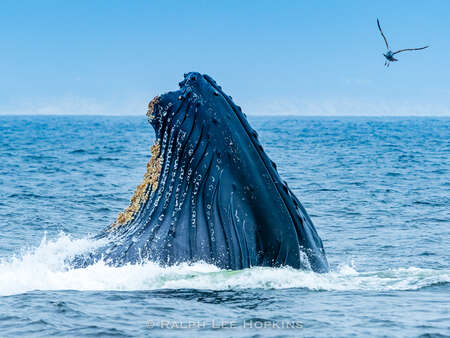
OM-D E-M1X | M.Zuiko 12-100mm F4.0 IS PRO + MC-14
1/2000s | F5.6 | ISO 1600
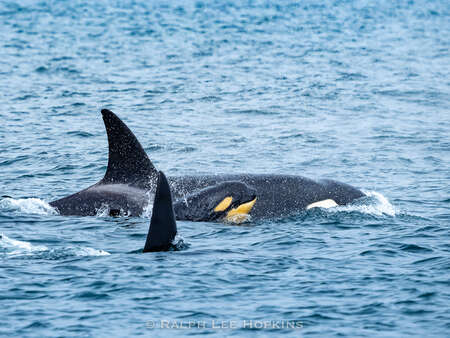
OM-D E-M1X | M.Zuiko 12-100mm F4.0 IS PRO + MC-14
1/2500s | F5.6 | ISO 160
Compositional Tips
- Using zoom lens is preferable in order to vary compositions from a fixed location on the boat.
- Start by shooting wide with cropping in mind
- With a few shots in the bag, zoom in for tight compositions
- Get as low to the water as possible (stern of the boat)
- Photograph the whale tales (flukes) and submit to HappyWhale.com for identification
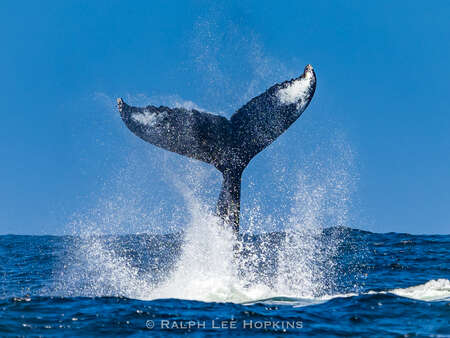
OM-D E-M1X | M.Zuiko 150-400mm F4.5 TC1.25X IS PRO + MC-14
1/1600s | F5.6 | ISO 250
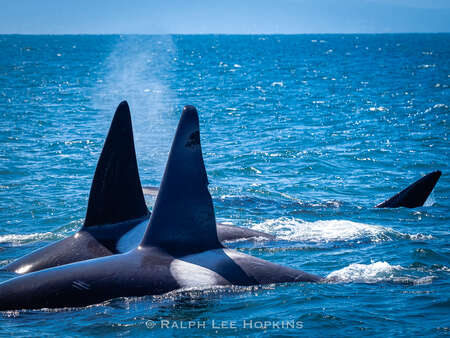
I shot this tight composition to capture the saddle patch markings and nicks on fins that help identify individuals. These whales are in the CA51 Pod, with “Orion” (CA51B) with the smooth fin in the background and “Bumper” (CA51C) with the notch in the foreground..
OM-D E-M1X | M.Zuiko 150-400mm F4.5 TC1.25X IS PRO
1/2500s | F5.6 | ISO 800
Camera Settings
The most important setting when shooting from a boat is a fast shutter speed to stop the action.
- Shoot in manual mode (with Auto ISO) or shutter priority
- Set F stop to wide open (f/2.8-4.0) with a fast shutter speed (1/1000 sec or above)
- Under-expose 2/3 stop or more (– 0.7 = minus compensation) if water is dark
- Over-expose 1/3 stop or more (+ 0.3 = plus compensation) if silvery water with highlights

Instagram: @ralphleehopkins
Ralph Lee Hopkins travels to the world’s wild places with Lindblad Expeditions and National Geographic. As Director of Expedition Photography for the National Geographic fleet he has photographed expeditions from the Arctic to the Antarctic and points in between over the last 30 years.







